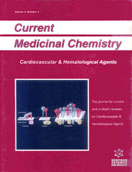Abstract
The optimal drugs employed in the antithrombotic treatment and prophylaxis have ideally been suggested to have high efficacy and safety and to be easy to use as regards the administration route and the fashion of monitoring the anticoagulant effect. A number of agents are under development in order to improve such requirements. Among them, the present review is focussed on a selective factor Xa inhibitor (pentasaccharide fondaparinux) and the direct thrombin inhibitors now available on a clinical ground. Fondaparinux is the first of a new class of selective antithrombin-dependent factor Xa inhibitors; it does not interact with plasma proteins other than antithrombin, leading to a predictable pharmacokinetics, which renders monitoring and dose adjustment unnecessary. The efficacy and safety of fondaparinux has been assessed in a number of clinical trials. In patients undergoing major orthopaedic surgery, a 2.5 mg s.c administration once daily induced a 50% average relative risk reduction for overall venous thromboembolism in comparison with enoxaparin but also an increased rate of major bleeding. Parenteral direct thrombin inhibitors include hirudin, bivalirudin and argatroban. these inhibitors have been studied in patients with coronary heart disease. In particular, in patients undergoing percutaneous coronary interventions, bivalirudin showed equivalent or higher efficacy but lower bleeding in comparison with unfractionated heparin. Another series of molecules capable of inhibiting thrombin is derived from the site of fibrinogen to which thrombin binds. Inogatran and melagatran have a low bioavailability when given orally, whereas the chemically modified prodrug ximelagatran has a higher bioavailability. Ximelagatran is safe and effective at least as low molecular weight heparin in patients undergoing major orthopaedic surgery and is safe and effective also in prevention of recurrence in patients with venous thromboembolism or myocardial infarction; ximelagatran is more effective than oral anticoagulants in prevention of arterial embolism due to atrial fibrillation, with comparable safety.
Keywords: fondaparinux, hirudin, bivalirudin, argatroban, ximelagatran
 3
3













